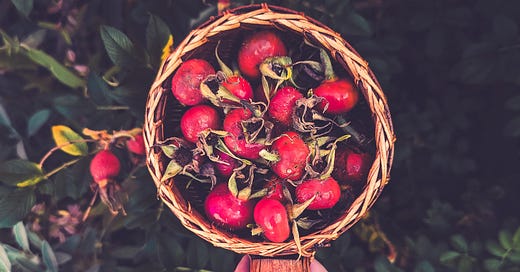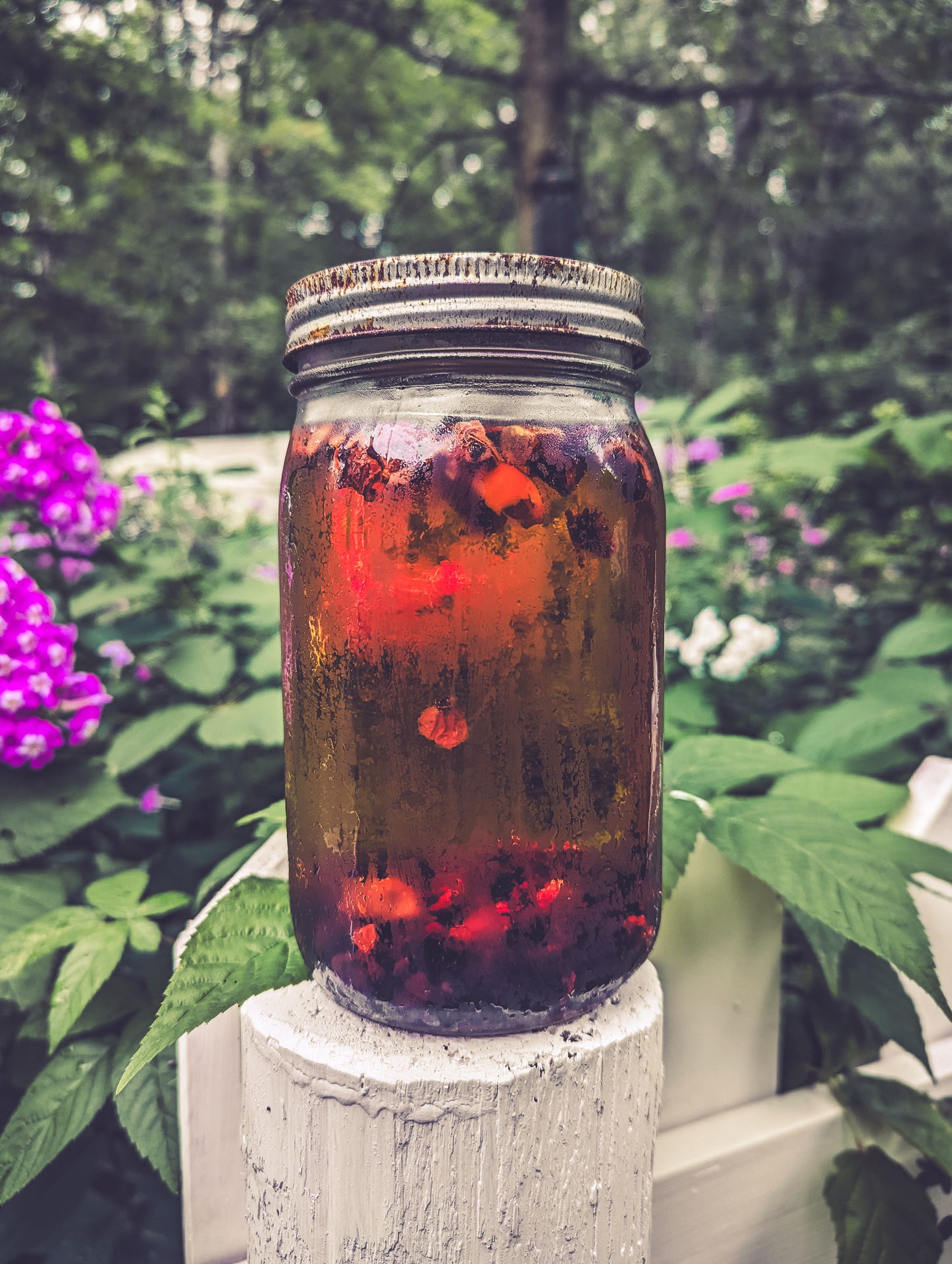The shiny bulbous body was flushed in shades of ruby and crimson beneath my fingers. Its form seemed to press against its own seams, trying desperately to keep its ripe innards intact. These large gems bestowed by the native roses and the smaller gems of the Eastern roses are just beginning to come of age in hedgerows across the countryside. Right now, rosehips are Queen.
There are few things that embody the fruitfulness of a season more than berries. Their lush juiciness ranges in shades of deepest ceruleans to royal maroons and fire reds, a perfect culmination of fertility and abundance. The dream of a seed to the hardiness of the first shoots, and the fragility of the flower is all encapsulated in the final ripening of the fruit, full of next year’s seeds, hopes and dreams.
But what do you know of rosehip medicine?
Its most touted benefits among the herbal community all revolve around its impressively high Vitamin C content. Because of this, rosehips are typically included in formulas where there is a nutrient deficiency or to boost immunity during the cold and flu season. In these formulas, rosehips seem to always play the supporting role. Always the bridesmaid, never the bride.
I was a bit guilty of this myself. I adore rosehips, but never spent the time thoroughly working with it on its own to discover the various sides of its personality.
As I often discover though, the medicine we need always finds us.
There are certain seasons in life when I’m drawn to a particular herb without knowing particularly why, especially if I’m dealing with an imbalance that isn’t traditionally a part of said herb’s repertoire. A day came when rosehips caught my eye.
At the time I was dealing with a seemingly endless bout of constipation. I had tried the laxative herbs, exercised, performed the digestive massages, but it would not give me relief.
When I began working with rosehips, I didn’t have it in my mind to use it for constipation. It just sounded good as an overnight cold infusion to be honest. But as the hips infused and the water turned from clear to a rich gold, medicine was made regardless of my intentions.
Within the first day of drinking my rosehip infusion, my bowels finally decided to cooperate. It was glorious, if you don’t mind me saying. So while it gave me relief, it also left me intrigued. Rosehips had never been taught to me as a constipation remedy, so I let its story unfold.
The more I dug, the more intrigued I became. Not only are they rich in Vitamin C and antioxidants, but they are also demulcent, meaning they are nourishing and moisturizing to our mucosa lining. They are also highly anti-inflammatory. That is when I learned something that had been staring me right in the face the whole time, I had misunderstood how the condition of constipation could manifest.
I had assumed it was a stagnant condition, hence the use of laxative herbs such as senna leaf, which can be useful in certain situations. But, if the constipation is due to a dry tight condition, demulcent anti-inflammatory herbs are much more preferable.
Rosehips are more than just a remedy for constipation too. I found multiple studies and writings about their use for other inflammatory conditions such as Crohns, arthritis, and heart disease. As for its effect on the bowels, it seems to normalize its efforts as it is a remedy for both constipation and diarrhea. This makes it an attractive ally for unpredictable gut conditions such as IBS and leaky gut.
While marshmallow root has similar actions, I often find myself instinctively reaching for rosehip when these types of inflammatory gut issues arise. Its high Vitamin C and antioxidant content boosts immunity (three quarters of our immune system lives in our gut after all) which I believe gives it a slight edge. However, I will often rotate between the two for chronic conditions to get a full range of medicinal goodness.
This could also just be the tip of what this powerhouse herb can do. There have been studies that show how rosehips can inhibit amylase, an enzyme that degrades starch, which then turns into glucose. This means that rosehips may be helpful in the treatment of diabetes.
But for now, I’m making rosehips the star in my gut support routine. I’m actually drinking an infusion of it as I write this newsletter. I often find that the most potent remedies are those that only include a minimal amount of herbs, even though it seems common for people to want to throw everything and the kitchen sink into a formula in the hopes of covering all their bases.
But if we can find the one herb that matches a person and condition perfectly, we may find healing comes quicker.
Of course there may be a need to add in other herbs along the way, but rosehips taught me that even traditionally supportive herbs can hold their own front and center.
As the rosehips ripen into their radiant selves this year, perhaps take a moment to study them a bit closer. Let the medicine come to you. See what it has to say. And always trust your curiosities.
For those interested in the infusion I made, here is what I did:
Rosehip Gut Infusion
Ingredients
2 TB dried rosehips
1 Quart cold water
Directions
Pour rosehips and cold water into a clean mason jar, cap, and set in the refrigerator. Let infuse overnight, or about 8 hours.
Strain and drink throughout the day.
*Note: you can make this as a hot infusion instead of a cold infusion, I just prefer the cold. Feel free to experiment and see what works best with your body.
Take care my friend.
Much love,
Val
If you enjoyed this article, consider sharing it with your other plant friends!
And if you’re not already subscribed, sign up to receive more plant love directly to your inbox. No spam, just an herbalist and gardener sharing her stories.







Thank you so much for this article. To be honest, I really didn’t know much about rose hips, certainly not the fresh ones. I learned a lot about constipation the hard way and ultimately, the way I think of it is that the longer the material stays in the body, the most water is sucked out making it even more difficult. For diarrhea, the material doesn’t stay in the intestines long enough for proper moisture to be removed. When you said that hips were demulcent, moisturizing the mucous membranes, it all clicked into place. In my head now, I can see the hips coming into areas of the intestines that need something, providing whatever is needed to move toward balance. Very cool stuff indeed!
I don’t have any roses but I know of some wild bushes in my neighborhood . Tomorrow, I’m going to ask around and see if anyone would mind me poking around in their yards.
Thanks so very much!! Love it!!💚💚💚
Thank you for sharing, Val!
Wow! I definitely could stand to give rose-hips a try, for GI health. Very interesting, Indeed. I will have to try the recipe out. Love your writings! Thank you ❤️